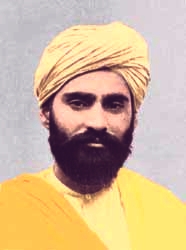Sundar Singh’s conversion to Christianity and his missionary journeys across India and Tibet became a source of deep inspiration for many evangelical Christians in the 20th century. His miraculous conversion and bold preaching efforts, especially in remote regions, were highly praised, and I first encountered his story through Christian radio dramatizations and books from evangelical bookstores. In fact, the prominent Christian apologist Josh McDowell highlighted Sundar’s conversion in his renowned work Evidence That Demands a Verdict. However, the universalistic views Sundar espoused were not mentioned in the more popular evangelical narratives but became clear only after I explored Sundar’s own writings and deeper biographies of his life.
Born into a Sikh family, Sundar was raised in a religious context that blended Hinduism and Sikhism. Sikhism, a monotheistic religion founded in the 16th century, rejects the caste system and idol worship. Prior to his conversion, Sundar attended an American Presbyterian mission school, where the New Testament was regularly read. Despite initial resistance, Sundar was drawn to the Christian message of God’s love, though he struggled with doubt. He recalled, “Although I believed that I had done a very good deed by burning the Bible, I felt unhappy.”

Sundar’s crisis of faith deepened when his beloved mother passed away. Grieving and angered by her loss, he publicly burned a Gospel. In his despair, Sundar prayed one night, asking God to reveal Himself if He truly existed, or else he planned to end his life. After hours of prayer, Sundar experienced a profound vision of Jesus Christ, who revealed Himself to Sundar with nail-pierced hands, declaring, “I died for you; I have given my life for you.” This vision, coupled with a feeling of overwhelming peace and joy, convinced Sundar that Jesus was indeed the true Savior.
Despite his family’s intense opposition, Sundar chose to follow Jesus and sought baptism. His conversion was seen as a betrayal by his Sikh community, resulting in his exile and social rejection. On his birthday in 1905, Sundar was baptized in an English church in Simla, marking the beginning of his new life in Christ. He later decided to adopt the lifestyle of a sadhu—a wandering ascetic—to make the Christian message more accessible to his people. Dressed in a yellow robe and living without possessions, Sundar traveled across India and the wider world, including Ceylon, Malaysia, Japan, China, and Europe, preaching a message of love, peace, and spiritual rebirth through Christ.
Throughout his travels, Sundar Singh remained humble and focused solely on following the example of Jesus Christ. He believed that by repaying evil with kindness and overcoming hatred with love, he could truly embody Christ’s teachings. His influence even led to the conversion of his father later in life, who eventually supported Sundar’s missionary work.
Sundar was highly independent in his spiritual life, often rejecting the authority of traditional Christian institutions. He was critical of what he saw as a shallow interpretation of Christianity in the West, especially in nations that had long been exposed to the Bible. Sundar’s critique of Western Christianity was sharp, emphasizing how the West had grown more focused on comfort and pleasure rather than spiritual truth. In conversations with prominent Christian leaders, he expressed a deep admiration for spiritual seekers in the East, even those who did not identify as Christians. He remarked, “People call us heathens, but my mother, though she followed her ancestral faith, loved God more deeply than many Christians.”
In his travels, Sundar often spoke about the true essence of spirituality and salvation. He believed that many people in India and the East lived more authentically spiritual lives than those in the West, despite not formally acknowledging Christ. “There are many more people among us in India who lead a spiritual life than in the West, although they do not know or confess Christ,” Sundar explained, challenging narrow religious interpretations.
Sundar’s journey took him to distant places, including the rugged terrain of Tibet, where he visited annually to share the Gospel. In 1929, Sundar disappeared during one of his trips to Tibet, and his fate remains a mystery. Despite his sudden disappearance, Sundar’s legacy as a fearless missionary and an advocate for a deeper understanding of Christ’s message endures.
While his evangelical followers emphasize Sundar’s conversion and missionary zeal, his own writings reveal a universalist view of God’s love, transcending religious boundaries. His life serves as a profound challenge to the conventional understanding of faith, urging a more inclusive and compassionate approach to spirituality and salvation.
Sundar Singh’s Faith for All Mankind: A Universalist Perspective
Few Christians are aware that Sundar Singh, renowned for his bold missionary work, was also an advocate for universalism—a belief that the possibility of salvation extends beyond just Christians. Sundar could never accept the idea that non-Christians were forever excluded from heaven. In 1925, Sundar wrote, “If the Divine spark in the soul cannot be destroyed, then we need despair of no sinner… Since God created men to have fellowship with Himself, they cannot forever be separated from Him… After long wandering, and by devious paths, sinful man will at last return to Him in whose Image he was created; for this is his final destiny.” This statement reflects his deeply inclusive view of salvation and spirituality.
During an interview in February 1929, the same year Sundar vanished during his final missionary journey to Tibet, he answered several theology students’ questions in Calcutta, India. Here’s a look at his insightful responses, which reveal his stance on Christianity, other religions, and theological divisions:
(Question #1) What should be our attitude towards non-Christian religions?
Sundar urged Christians to abandon the old habit of calling non-Christians “heathens.” In his view, the worst “heathens” were often found among those who claimed to be Christians. He believed that a respectful attitude toward all religions was essential and that true spirituality went beyond mere labels.
(Question #2) Who were right, Christian Fundamentalists or Christian Liberals?
Sundar criticized both extremes within Christianity. He condemned Christian Fundamentalists for their uncharitable attitudes toward those with differing beliefs, calling their behavior unchristian. On the other hand, he also criticized Christian Liberals for sometimes going so far as to deny the divinity of Jesus Christ, a stance he found equally problematic.
Sundar’s inclusive views on salvation and his critiques of both Christian Fundamentalism and Christian Liberalism emphasize his belief that spiritual truth transcends rigid doctrinal boundaries. His message advocates for unity in diversity, encouraging Christians to adopt a more loving and open-hearted approach to non-Christian religions and those who differ in their theological perspectives.
Sundar Singh’s legacy as a missionary and spiritual leader not only challenged traditional views on salvation but also offered a broader, more inclusive understanding of faith and spiritual life, one that sought harmony among different worldviews. His universalistic ideas continue to resonate with those who believe in a loving and compassionate God, regardless of religious background.
Sundar Singh’s View on Eternal Punishment and Redemption
When asked about the concept of eternal punishment, Sundar Singh shared a perspective that differed from traditional Christian doctrine. In his 1929 interview with theology students in Calcutta, Sundar acknowledged the existence of punishment, but he firmly rejected the idea of it being eternal.
(Question #3) Did the Sadhu believe in eternal punishment?
Sundar explained that while punishment was a reality, it was not everlasting. He believed that, after this life, every soul would be given a fair opportunity to make amends, grow spiritually, and reach the fullest measure of their potential. “This might sometimes take ages,” he added, suggesting that the process of redemption and transformation could extend far beyond a single lifetime.
Sundar’s view emphasizes divine mercy and the idea that God’s justice is not final or cruel, but rather a process that gives every soul the chance to heal and evolve. His belief in a merciful God who offers opportunities for redemption challenges the traditional concept of eternal damnation, offering hope for spiritual growth in this life and beyond.
Additional Quotes by Sadhu Sundar Singh
“He was searching for me before I sought Him. Christ whom I had never expected came to me. I was praying, ‘If there be a God, reveal Thyself’…I was praying to Hindu gods and incarnations. But when He came there was no anger in His face, even though I had burnt the Bible three days before. None of you have ever destroyed Scripture like me. He is such a wonderful, loving, living Saviour…”
“There is a great difference between knowing about Jesus and knowing Him… If we only know of Jesus as a good man, a great example, it is no help to us. Those who know Him know Who He is. When we know Him everything is different and we are living in a new world — a new atmosphere. Heaven begins on earth for us. Those who know Him know that Jesus is everything to them. They can bear witness because they have been living with Him…If we live in Him He will reveal Himself to us and we shall bear witness — not for a day or a night only…”
“For the first two or three years after my conversion, I used to ask for specific things. Now I ask for God. Supposing there is a tree full of fruits — you will have to go and buy or beg the fruits from the owner of the tree. Every day you would have to go for one or two fruits. But if you can make the tree your own property, then all the fruits will be your own. In the same way, if God is your own, then all things in Heaven and on earth will be your own, because He is your Father and is everything to you; otherwise you will have to go and ask like a beggar for certain things. When they are used up, you will have to ask again. So ask not for gifts but for the Giver of Gifts: not for life but for the Giver of Life — then life and the things needed for life will be added unto you.”
“Salt, when dissolved in water, may disappear, but it does not cease to exist. We can be sure of its presence by tasting the water. Likewise, the indwelling Christ, though unseen, will be made evident to others from the love which he imparts to us.”
“From my many years experience I can unhesitatingly say that the cross bears those who bear the cross.”
“While sitting on the bank of a river one day, I picked up a solid round stone from the water and broke it open. It was perfectly dry in spite of the fact that it had been immersed in water for centuries. The same is true of many people in the Western world. For centuries they have been surrounded by Christianity; they live immersed in the waters of its benefits. And yet it has not penetrated their hearts; they do not love it. The fault is not in Christianity, but in men’s hearts, which have been hardened by materialism and intellectualism.”
“When Jesus entered Jerusalem the people spread their clothes in the way and strewed branches before Him in order to do Him honour. Jesus rode upon an ass, according to the word of the prophet. His feet did not touch the road which was decorated in His honour. It was the ass which trod upon the garments and the branches. But the ass would have been very foolish to have been uplifted on that account; for the road really was not decked in its honour! It would be just as foolish if those who bear Christ to men were to think anything of themselves because of what men do to them for the sake of Jesus.”
“A newborn child has to cry, for only in this way will his lungs expand. A doctor once told me of a child who could not breathe when it was born. In order to make it breathe the doctor gave it a slight blow. The mother must have thought the doctor cruel. But he was really doing the kindest thing possible. As with newborn children the lungs are contracted, so are our spiritual lungs. But through suffering God strikes us in love. Then our lungs expand and we can breathe and pray.”
“Just as the salt water of the sea is drawn upwards by the hot rays of the sun, and gradually takes on the form of clouds, and, turned thus into sweet and refreshing water, falls in showers on the earth (for the sea water as it rises upwards leaves behind it its salt and bitterness), so when the thoughts and desires of the man of prayer rise aloft like misty emanations of the soul, the rays of the Sun of Righteousness purify them of all sinful taint, and his prayers become a great cloud which descends from heaven in a shower of blessing, bringing refreshment to many on the earth.”
Source Taken from : https://www.tentmaker.org/biographies/singh.htm




